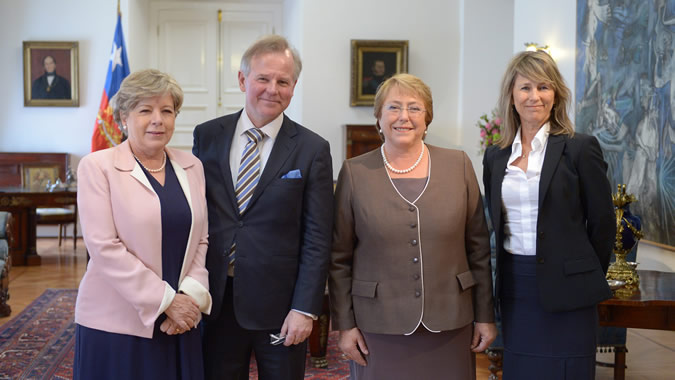Tackling Health Inequality Requires New Global Political Governance
Work area(s)
Ole Petter Ottersen, Rector of the University of Oslo, gave a keynote lecture at ECLAC and met with Chilean President Michelle Bachelet.

(March 23, 2015) The unacceptable inequalities in health both within and among countries cannot be addressed with technical measures or national ones inside that sector but instead require global political solutions, Ole Petter Ottersen, rector of the University of Oslo, said today during a keynote lecture he gave at the Economic Commission for Latin America and the Caribbean (ECLAC), in Santiago, Chile.
At the headquarters of the regional United Nations organization, the prestigious Norwegian scholar presented the results of a study carried out by The Lancet—University of Oslo Commission on Global Governance for Health, which examined power disparities and dynamics across a range of policy areas that affect health.
Subsequently he visited Chilean President Michelle Bachelet in La Moneda presidential palace and also met with Health Minister Carmen Castillo.
At ECLAC, Ottersen was received by the organization’s Executive Secretary, Alicia Bárcena, who was awarded a doctorate honoris causa by the University of Oslo in 2014 and was invited to take part in the panel providing follow-up to the global commission on health governance. “His commitment to understanding and fighting inequality is infused with his vision of how economic and political interests should interact with efforts to reduce inequality,” she said.
“His work describes power disparities as the main source of inequalities, which is very close to the thinking of ECLAC,” Bárcena added.
In his lecture entitled “The political origins of health inequity,” Professor Ottersen explained that economic growth and technical interventions are not enough to provide good health to the most vulnerable sectors of society.
“The decisions made in political domains outside of the health sector must have health at the core of thinking. We need to be aware of, move beyond social elements, and act upon the political determinants of health,” he emphasized.
The Rector of the University of Oslo specified the seven policy areas that affect health and that require improved governance: economic crises and austerity measures; knowledge and intellectual property; foreign investment treaties; food security; transnational corporate activity; irregular migration; and violent conflict.
To carry out the work examined by The Lancet—University of Oslo Commission, a panel of international experts on global governance for health was convened to provide evidence based on high-quality research to influence political processes that impact global health. ECLAC’s Executive Secretary is a member of this panel.
“We must no longer regard health only as a technical biomedical issue, but acknowledge the need for global cross-sectoral action and justice in our efforts to address health inequity,” Ottersen said.
Related link(s)
Country(ies)
-
Chile
Related project(s)
Contact
Public Information Unit
- prensa@cepal.org
- (56 2) 2210 2040